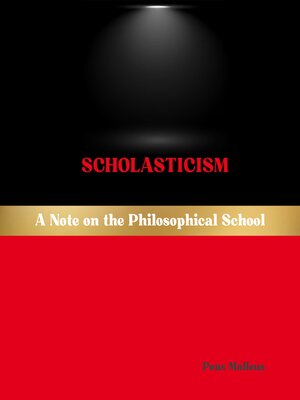Scholasticism
audiobook (Unabridged) ∣ A Note on the Philosophical School · Western Philosophical Schools
By Pons Malleus

Sign up to save your library
With an OverDrive account, you can save your favorite libraries for at-a-glance information about availability. Find out more about OverDrive accounts.
Find this title in Libby, the library reading app by OverDrive.



Search for a digital library with this title
Title found at these libraries:
| Library Name | Distance |
|---|---|
| Loading... |
This audiobook is narrated by a digital voice.
This audiobook is an invitation to journey into one of the most formidable and enduring intellectual traditions in Western philosophy: scholasticism. Emerging in the early Middle Ages and flourishing through the High and Late Medieval periods, scholasticism was not merely a method of academic discourse or a style of teaching—it was a profound attempt to reconcile faith with reason, theology with philosophy, and classical heritage with Christian doctrine. Though often caricatured as dry, overly technical, or rigidly dogmatic, scholastic thought represents a remarkable chapter in the history of human inquiry, one marked by intellectual rigor, spiritual aspiration, and an abiding belief in the power of reason to illuminate the truths of faith.
The roots of scholasticism are deeply embedded in the rediscovery and appropriation of ancient philosophical texts—most notably the works of Aristotle—through the lens of Christian theology. The scholastic masters, such as Anselm of Canterbury, Peter Abelard, Thomas Aquinas, Duns Scotus, and William of Ockham, sought to synthesize the insights of pagan antiquity with the teachings of the Bible and the Church Fathers. Their project was not an uncritical merger, but a dynamic engagement: where ancient philosophy seemed to challenge revealed doctrine, it was examined, interpreted, and often restructured to serve a higher theological vision.
This tradition unfolded primarily within the newly founded universities of medieval Europe—Paris, Oxford, Bologna—where dialectical reasoning, structured disputations, and systematic treatises became the tools of scholarly pursuit. At the heart of scholasticism lay a confidence that human reason, properly exercised, could explore the mysteries of existence, ethics, and God Himself. Far from stifling thought, this methodical and often meticulous approach to knowledge provided the groundwork for centuries of philosophical and theological development.







